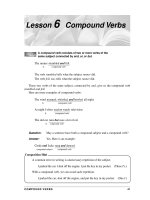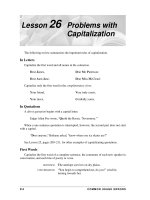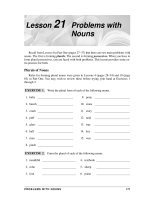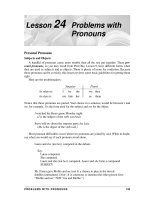Grammar And Usage For Better Writing - Sentence Composition
Bạn đang xem bản rút gọn của tài liệu. Xem và tải ngay bản đầy đủ của tài liệu tại đây (77.78 KB, 34 trang )
115
Part
TWO
Sentence
Composition
All writing begins with the sentence. In Part One, we explored the parts of speech, the
building blocks of sentences. This part directs attention to the structure and quality of sen-
tences. It asks you to judge between good and bad examples—and encourages you to write
good ones. With a little practice, you can produce sentences that say what you mean in a
fresh and effective way.
116 SENTENCE COMPOSITION
Lesson
18
Characteristics
of Good
Sentences
Sentences vary widely in style and subject matter. Yet all good sentences have certain
qualities in common.
1. Good sentences do not waste words. They use only enough words to carry the
thought. Nor do they wander. They make their point . . . and stop (pages 123–126).
WORDY
: The difficulties we cause in this all-too-brief life of ours
are often those that we bring upon ourselves, even if
unintentionally.
CONCISE
: Most of the shadows of this life are caused by our
standing in our own sunshine. (Ralph Waldo Emerson)
2. Good sentences are clear. They express a thought precisely and directly
(pages 126–132).
MUDDLED
: Andrew got up to bat and sent it into the right-field
stands.
CLEAR
: Andrew got up to bat and sent the ball into the right-
field stands.
3. Good sentences have unity. They stick to one general topic in a sentence
(pages 145–148).
LACKING IN
Good tennis players don’t have to work very hard,
UNITY
: but golfers sometimes seem to enjoy the game more.
UNIFIED
: A good tennis player works hard but never looks as
though he is.
4. Good sentences are coherent, using accurate connectives (page 127).
LACKING
Because Sue was our best pitcher, she didn’t get a
COHERENCE
: chance to pitch in the playoffs.
COHERENT
: Although Sue was our best pitcher, she didn’t get a
chance to pitch in the playoffs.
5. Good sentences are varied in structure. They do not always follow a set pattern
(pages 132–145).
MONOTONOUS
: Isabella is pretty and rich. She is also a fabulous singer.
I envy her.
VARIED
: Isabella is not only pretty and rich but also a fabulous
singer. How I envy her!
6. Good sentences call upon strong, specific nouns and vivid verbs to convey
the thought. They use adjectives and adverbs sparingly but effectively
(pages 124–126).
DULL
: The duck landed on the ice unsuccessfully and finally
came to a stop after a long slide along the ice on the
pond.
VIVID
: The mallard landed uncertainly on the ice, skidded and
flopped along for twenty feet, and then scrambled to its
feet with dignity.
7. Good sentences are pleasing to read, usually an enjoyable part of a larger whole
(pages 150–155).
8. Good sentences are complete, neither fragments (pages 155–164) nor run-ons
(pages 164–168).
9. Good sentences are technically correct, following accepted standards of usage
(pages 149–230) and spelling (pages 221–230).
Comparing Sentences
It is helpful to read good sentences written by others. Here is an example of a power-
ful, simple sentence:
At the center of nonviolence stands the principle of love. (Martin Luther
King, Jr.)
How much less effective it would have been if stated in this way:
People who believe in nonviolence and practice it are really showing that
they love others.
Question:
Why is the first sentence so much better?
Answer:
The first sentence is direct, clear, concise.
CHARACTERISTICS OF GOOD SENTENCES 117
EXERCISE 1.
Which sentence in each pair do you consider better? Tell why.
1. a. We went on the roller coaster and then we went on the haunted house ride and
then we went on the monorail.
b. We went on the roller coaster, the haunted house ride, and the monorail.
2. a. At the library, I picked up a Harry Potter book and a book about photography.
b. I went to the library and I picked up a book about Harry Potter and a book that
tells all about photography.
3. a. The family had all agreed on a camping spot for our vacation, and Brad suddenly
disagreed.
b. The family had all agreed on a camping spot for our vacation, but Brad suddenly
disagreed.
4. a. I ordered a sandwich made with cheese, a bag filled with potato chips, and an
apple for lunch.
b. For lunch, I ordered a cheese sandwich, a bag of potato chips, and an apple.
5. a. Liv had accepted Joel’s invitation to the dance, and she changed her mind with no
explanation.
b. Liv had accepted Joel’s invitation to the dance, but she changed her mind with no
explanation.
118 SENTENCE COMPOSITION
Completing Comparisons
In the previous section, we compared sentences to see which ones were better. We can
also use comparison as a writing tool to make sentences more concise, lively, and enjoy-
able to read.
Consider the following sentence, in which baseball players are compared to bees:
The baseball players gathered around the umpire like angry bees.
By using the image of the angry bees, we do not have to say that the players were ag-
gressive and quick in their movements or that their complaints sounded like a loud buzz
around the umpire. The image of the bees does that for us. Using a comparison in this way
saves words and creates interest.
If you paid close attention to your speech, you would find that you use many compar-
isons. Some are direct, with like or as: “as strong as an ox,” “as timid as a mouse,” “like a
lion.” Others are indirect: “Joan was a tiger on the field.” (Joan played as savagely as a
tiger.) Both forms are a kind of poetry. Direct comparisons are called similes. Indirect
ones are metaphors. In the following exercise, try your skill in writing sentences with
comparisons.
EXERCISE 2.
Complete each of the following with an original comparison.
Sample:
A book is like a new friend waiting to meet you.
1. A thunderstorm is like
2. A cat is like
3. A final exam is like
4. A forest fire is like
5. Playing basketball is like
6. The school cafeteria is like
7. A good friend is like
8. The city at night is like
9. Browsing the Web is like
10. Swimming in the ocean is like
CHARACTERISTICS OF GOOD SENTENCES 119
Writing Sentences
When you begin to write a sentence, you should know where you are going with it.
Complete the thought you set out to express. As you put your thought in writing, remember
the nine characteristics of good sentences, outlined at the beginning of this lesson. Lesson
19 will show some specific ways to write effective sentences.
EXERCISE 3.
Complete each of the following to make a good sentence.
Sample:
My final grades improved so much over last year’s that my scholarship chances rose
dramatically.
1. My major ambition in life is to
2. After dinner, I am planning
3 My favorite way to spend Saturday is to
4. Last summer, I
5. Computers
6. For dessert
7. When the football game was over
8. I hope
9. At the end of the movie
10. Why didn’t
EXERCISE 4.
Write a single good sentence that tells about each of the following.
Sample:
a favorite pet
I once had a parakeet named Humphrey, who enjoyed flying around the room.
1. an unusual coincidence that occurred recently
120 SENTENCE COMPOSITION
2. a happy moment in your life
3. something you are proud of
4. a surprise
5. the person who influences you most
Revising Sentences
Revising is an important part of the writing process. It is helpful to reread what you
have written. Chances are, you will discover an error, uncover something that may not be
clear to readers, or simply find a more interesting or memorable way to say what you
wrote. Are your sentences technically correct, precise, concise, and effective? Make it a
habit to answer this question by rereading and revising every sentence before you send it
out into the world.
EXERCISE 5.
Select ten of the fifteen sentences you wrote for Exercises 3 and 4 and
revise them. Aim for conciseness and clarity by eliminating unnecessary or vague words.
Sample:
Original sentence: My final grades improved so much over last year’s that my schol-
arship chances rose dramatically.
Revised sentence: My scholarship chances skyrocketed because my final grades
greatly improved this year.
1.
2.
3.
4.
CHARACTERISTICS OF GOOD SENTENCES 121
5.
6.
7.
8.
9.
10.
122 SENTENCE COMPOSITION
CLEAR, FORCEFUL SENTENCES 123
Lesson
19
Clear, Forceful
Sentences
Question:
What makes writing “good”?
Answer:
Good writing has four major characteristics: conciseness (economy),
clarity, variety, and unity.
Conciseness (Economy)
Never make a thought more complicated than it really is. Express yourself as simply
and directly as possible. Here are some errors to avoid.
Useless Words
Eliminate all useless words.
WORDY
: At the soccer match, Joel met up with two friends
from elementary school.
CONCISE
: At the soccer match, Joel met two friends from ele-
mentary school. (Eliminate up with.)
Duplication
Avoid saying the same thing twice, even though in different words.
WORDY
: We flew by air to Cleveland and returned back by bus.
CONCISE
: We flew to Cleveland and returned by bus. (Eliminate
by air and back.)
Wordy Construction
Do not use too many words to express an idea. Condense a phrase (see pages 137–140,
145) to a word, a clause to a phrase or even a word. Be a which hunter and eliminate all
unnecessary whiches (or thats).
WORDY
: The newscast which was televised this morning on a
local station described a suspicious car that had a
license plate from the state of North Dakota.
CONCISE
: This morning’s local television newscast described a
suspicious car with a North Dakota license plate.
Pretentious Language
Unless you are being humorous, do not use a longer word if a simpler one will do the
job. Save the longer word for a context in which the simpler one does not work.
PRETENTIOUS
: The feline member of our family loves to frolic, gam-
bol, and cavort for considerable periods of time with
the canine member of our family menage.
SIMPLER
: Our cat often plays with the family dog.
Note:
The first sentence might be acceptable in a humorous essay that mocks pretension.
Piled-up Modifiers
Avoid piling adjective upon adjective, adverb upon adverb. Where possible, use spe-
cific nouns and verbs to reduce the number of modifiers.
WORDY
: The young, immature baby of but a year walked un-
steadily and shakily across the floor into the out-
stretched, waiting arms of her waiting mother.
CONCISE
: The one-year-old tottered across the floor into her
mother’s outstretched arms.
EXERCISE 1.
In each pair of sentences, choose the more concise and point out why
the chosen sentence is preferable.
1. a. The house which stood on the corner of Main Street and Maple Avenue has been
declared a landmark with historic associations.
b. The house on the corner of Main Street and Maple Avenue has been declared a
historic landmark.
2. a. July daytime temperatures this year have averaged about 73 degrees.
b. July temperatures during the day this year have averaged about 73 degrees on the
average.
3. a. The Paso Fino is a relatively small horse with a distinctive, appealing gait.
b. Of the equine breed, the Paso Fino is a horse that is relatively small but with a gait
that is as distinctive as it is appealing.
124 SENTENCE COMPOSITION
4. a. The Chrono watch is cheap in price but efficient in use.
b. The Chrono watch is cheap but efficient.
5. a. When Sasha found she had lost her keys, she rushed to the store she had just left.
b. When Sasha found she had carelessly and thoughtlessly lost her keys, she rushed
rapidly and swiftly into the store she had just left.
EXERCISE 2.
Rewrite the following selections to make them more concise. Keep in
mind the preceding suggestions.
1. The bus that I take to school seems to have one shock absorber that is faulty.
2. My favorite pet among all pets is the canine pet.
3. My brother owns an old car that has rust.
4. In Huckleberry Finn it tells the story of a boy on the Mississippi.
5. The Biltmore House in Asheville is a magnificent house, probably the largest man-
sion in the nation.
6. Paint that has lead as its base should be removed from all buildings located every-
where.
CLEAR, FORCEFUL SENTENCES 125
7. She was a tiny little girl with a big, huge, gigantic, booming voice.
8. The rich ancient old man who had piles of money picked up a wad of cash with his
hands.
9. Bill waited outside of the classroom while Scott, who was very, very late, was still
inside of the classroom.
10. I fixed up each and every last one of my wrong mistakes before I saved the file.
Clarity and Specificity
Write clearly as well as concisely. Here are some errors to avoid.
Unclear Antecedents
Make certain that a pronoun has a clear antecedent (see pages 52–54 in Part One and
page 196 in Part Three). Reword the sentences or supply a needed noun.
CONFUSING
: Use that towel to wipe your face and put it in the clothes
hamper.
(The face or the towel?)
CLEAR
: Use that towel to wipe your face and put the towel in the
clothes hamper.
CONFUSING
: If papers are left behind by sloppy hikers, burn them.
(The papers or the hikers?)
CLEAR
: Any papers left behind by sloppy hikers should be
burned.
If necessary, quote the speaker’s actual words to make the meaning clearer.
CONFUSING
: Linda told her mother that she had left the lawn sprin-
klers on.
(Is the antecedent of “she” Linda or her mother?)
CLEAR
: Linda told her mother, “I left the lawn sprinklers on.”
CLEAR
: Linda told her mother, “You left the lawn sprinklers on.”
126 SENTENCE COMPOSITION
Dangling Modifiers
A modifier dangles if it is placed so that it seems to modify a word it was not intended
to modify. Put a modifier close to the word it modifies. Sometimes the word itself must be
supplied.
DANGLING
: Turning the corner, the post office was on the left.
(The post office was not turning the corner.)
CLEAR
: Turning the corner, I noticed the post office on my left.
CLEAR
: As I turned the corner, I noticed the post office on my
left.
CONFUSING
: Tracy saw a deer riding her bike through the Hopkins
meadow.
(A deer riding a bike?)
CLEAR
: Riding her bike through the Hopkins meadow, Tracy
saw a deer.
CONFUSING
: At the age of three, Mario’s mother remarried.
(At the age of three, Mario’s mother could not have al-
ready had Mario, let alone be remarrying.)
CLEAR
: When Mario was three, his mother remarried.
CONFUSING
: While working in the library, a new shipment of books
arrived.
(The books are not working; the library worker is.)
CLEAR
: While I was working in the library, a new shipment of
books arrived.
CONFUSING
: At the party, packages were given to all the children
filled with Halloween candy.
(The children may be filled later!)
CLEAR
: At the party, packages filled with Halloween candy
were given to all the children.
Inaccurate Connectives
Use the connective that expresses your thought accurately.
CONFUSING
: I wanted to go skating, and Angela preferred hiking.
CLEAR
: I wanted to go skating, but Angela preferred hiking.
CONFUSING
: Because Ben was on a visit to his ill grandmother, he
still got his term paper in on time.
CLEAR
: Although Ben was on a visit to his ill grandmother, he
still got his term paper in on time.
CLEAR, FORCEFUL SENTENCES 127









